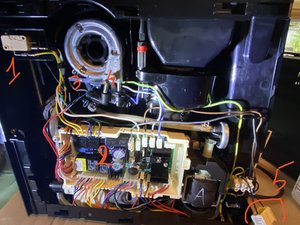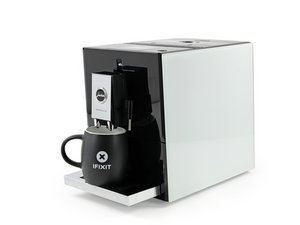Jura A9 won’t turn on!
Hello everyone,
My Jura A9 acted weird lately, when starting brewing or grinder it would just shut off abruptly!
The other day that was it, it stopped working completely.
After opening it and following some tutorials i couldn’t find anything wrong inside. The grinder ok, the brewing unit ok, the swith (1) ok, the PCBA (2) ok no signs of burnt area, same for the pcba of the display, fuses (3) ok, thermocouple (4) ok… the only doubt I have is on the 2 capacitors (5) one of them makes a weird noise like a buzz noise. I do have a voltage but nothing, the machine won’t turn on.
Any idea on what I can check?
Thanks for your help.

Ist dies eine gute Frage?

 2
2
Same problem. Not been able to find a solution yet, wither.
von Werner du Toit
You can buy an ESR meter like https://a.co/1RTapy2 to test the capacitors. First, take the PCB out of the coffee machine to get to the connections on the bottom (take note of the colors or wire and where they connect to the PCB). Discharge the capacitors by putting a resistor on the two leads of the capacitor. Now connect the ESR meter to the positive and negative leads of the capacitor. Take note of the reading. If it is higher than the max allowable ESR on the meter, you will need to replace the capacitor in question.
Capacitance- The amount of charge the capacitor can hold. Expressed in microfarads(uF) for Aluminum Electrolytic capacitors.
Voltage- How much voltage the capacitor is designed to withstand.
Both if these values will be printed on the capacitor.
Let me know when your ESR meter arrives.
von Andrew S
@andrewsawesome thanks! What makes you think its a capacitor issue? For a couple of weeks the machine would turn in, then shut down halfway through the brew routine. The “on time” would befome shorter and ahorter until, now, it doesn’t come on at all.
It feels to me like some sort of safety switch issue. Some connecter is rusted or dirty and preventing a startup.
Happy to hear your thoughts. I’ll be getting that in circuit meter too, though.
von Werner du Toit
@orangefixer Well, it's either the capacitors, relays, or the silicon (transistors, op-amps, etc.). The capacitors are easy to test. Plus, they're Su'scon capacitors, which immediately makes them suspect.
von Andrew S
Ok. Thanks. Will get one and test.
von Werner du Toit
8 weitere Kommentare anzeigen